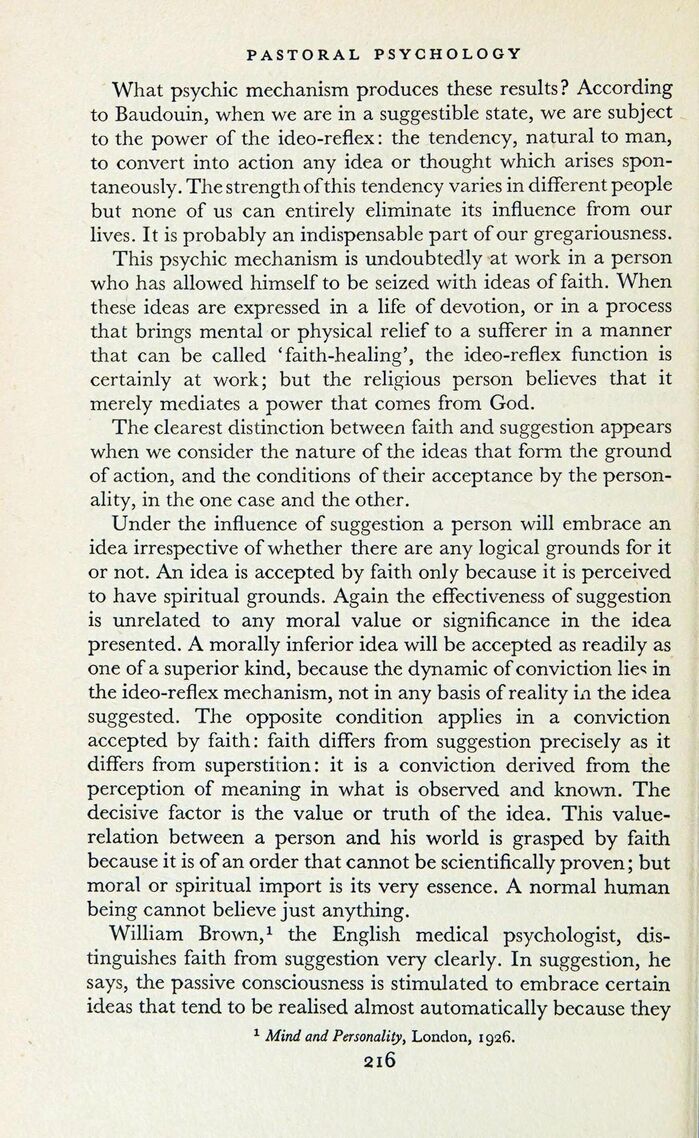
Full resolution (JPEG) - On this page / på denna sida - Part 6. The Psychology of Conversion and Growth in Grace - 3. Faith or Suggestion?

<< prev. page << föreg. sida << >> nästa sida >> next page >>
Below is the raw OCR text
from the above scanned image.
Do you see an error? Proofread the page now!
Här nedan syns maskintolkade texten från faksimilbilden ovan.
Ser du något fel? Korrekturläs sidan nu!
This page has never been proofread. / Denna sida har aldrig korrekturlästs.
PASTORAL PSYCHOLOGY
What psychic mechanism produces these results? According
to Baudouin, when we are in a suggestible state, we are subject .
to the power of the ideo-reflex: the tendency, natural to man,
to convert into action any idea or thought which arises
spontaneously. The strength ofthis tendency varies in different people
but none of us can entirely eliminate its influence from our
lives. It is probably an indispensable part of our gregariousness.
This psychic mechanism is undoubtedly at work in a person
who has allowed himself to be seized with ideas of faith. When
these ideas are expressed in a life of devotion, or in a process
that brings mental or physical relief to a sufferer in a manner
that can be called ‘faith-healing’, the ideo-reflex function is
certainly at work; but the religious person believes that it
merely mediates a power that comes from God.
The clearest distinction between faith and suggestion appears
when we consider the nature of the ideas that form the ground
of action, and the conditions of their acceptance by the
personality, in the one case and the other.
Under the influence of suggestion a person will embrace an
idea irrespective of whether there are any logical grounds for it
or not. An idea is accepted by faith only because it is perceived
to have spiritual grounds. Again the effectiveness of suggestion
is unrelated to any moral value or significance in the idea
presented. A morally inferior idea will be accepted as readily as
one of a superior kind, because the dynamic of conviction lies in
the ideo-reflex mechanism, not in any basis of reality ia the idea
suggested. The opposite condition applies in a conviction
accepted by faith: faith differs from suggestion precisely as it
differs from superstition: it is a conviction derived from the
perception of meaning in what is observed and known. The
decisive factor is the value or truth of the idea. This
valuerelation between a person and his world is grasped by faith
because it is of an order that cannot be scientifically proven; but
moral or spiritual import is its very essence. A normal human
being cannot believe just anything.
William Brown,! the English medical psychologist,
distinguishes faith from suggestion very clearly. In suggestion, he
says, the passive consciousness is stimulated to embrace certain
ideas that tend to be realised almost automatically because they
1 Mind and Personality, London, 1926.
216
<< prev. page << föreg. sida << >> nästa sida >> next page >>